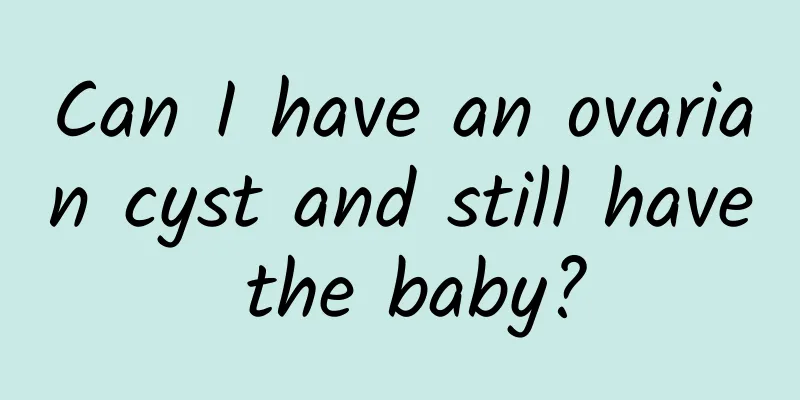Can I have an ovarian cyst and still have the baby?

|
If you are pregnant with an ovarian cyst, you can usually give birth, but whether to intervene depends on the nature and size of the cyst and the specific situation of the pregnant woman. Most ovarian cysts will not have a direct impact on the fetus during pregnancy, but they still need to be closely monitored. 1. Types and effects of ovarian cysts Ovarian cysts are divided into physiological cysts and pathological cysts. Physiological cysts, such as corpus luteum cysts, usually disappear on their own during pregnancy and have no effect on the fetus. Pathological cysts, such as endometriosis cysts or teratomas, may cause abdominal pain due to increase in size or torsion and need to be treated promptly. Changes in hormone levels during pregnancy may cause the cyst to increase in size, but in most cases it will not affect fetal development. 2. Monitoring and management during pregnancy If an ovarian cyst is found during pregnancy, the doctor will regularly monitor the changes in the cyst through B-ultrasound. If the cyst is small and asymptomatic, no special treatment is usually required. If the cyst is larger than 5 cm or there are complications such as pain, torsion, rupture, etc., surgery may be required. The timing of surgery is generally chosen in the second trimester of pregnancy, 14-20 weeks, when the fetus is relatively stable and the risk of surgery is low. 3. Choice of delivery method Most women with ovarian cysts can give birth naturally, but if the cyst is located in a special place or is too large, it may increase the difficulty of delivery and need to consider cesarean section. The doctor will develop a personalized delivery plan based on the cyst situation and the overall health of the pregnant woman. 4. Diet and lifestyle advice Pregnant women with ovarian cysts should avoid strenuous exercise to prevent the cyst from twisting or rupturing. It is recommended to eat more fiber-rich foods, such as vegetables and fruits, and avoid high-fat and high-sugar diets to maintain weight and hormone balance. At the same time, keep a happy mood and avoid excessive anxiety. If you are pregnant with an ovarian cyst, you don't need to worry too much, but you need to have regular prenatal checkups and pay close attention to changes in the cyst. In most cases, you can give birth smoothly, but if you have abnormal symptoms, you should seek medical attention in time. Through scientific monitoring and reasonable intervention, the health of mother and baby can be effectively guaranteed. |
<<: Vulvar itching, leucorrhea, abnormal odor
>>: There are methods to regulate abnormal leucorrhea
Recommend
How does Western medicine treat irregular menstruation?
In today's society, many women suffer from ir...
What are the methods for treating cervical erosion?
Do you know the methods that women use to treat c...
Only with the examination of vaginitis can patients detect the disease in time
Vaginitis is not unfamiliar to women. It is a ver...
Threatened abortion care experience
Nowadays, many only children have to go to work, ...
What are the triggering factors of threatened abortion?
What are the predisposing factors of threatened a...
Avoid long-term obesity. Six months after childbirth is the golden period for weight loss.
Postpartum women are eager to lose weight because...
A brief discussion on the diagnostic criteria of vaginitis
Vaginitis is a common gynecological inflammation ...
What treatments do you know for vaginitis?
What are the treatments for vaginitis? What treat...
Causes of adnexitis in women
What are the causes of adnexitis? Adnexitis is a ...
What are the symptoms of early vulvar leukoplakia?
The symptoms of vulvar leukoplakia are not obviou...
The following is an introduction to the safe abortion methods.
Many women who want to have an abortion want to k...
Early symptoms of vaginitis
Vaginitis causes great psychological pressure on ...
Detailed analysis of common knowledge on the treatment of cervical hypertrophy
If cervical hypertrophy cannot be discovered in t...
Can I get pregnant normally with bacterial vaginosis?
Vaginitis is a very common gynecological disease....
Symptoms of multiple uterine fibroids What to do if you have multiple uterine fibroids
The symptoms of multiple uterine fibroids need to...









